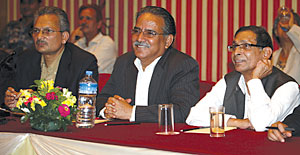 BIKRAM RAI |
The top three leaders of the Maoists who appeared together on the stage in Rautahat last week announced the party would not split. In a two-hour long program, the leaders were seen avoiding talking to each other.
The split is now manifested vertically down to the cadre level who mock of rival leaders openly by name. The leaders are all holding separate meetings of their supporters, publishing separate newspapers and magazines, forming parallel committees. It is as if the party has virtually split already.
Many argue that this is just a strategy. But given the party's internal disarray in recent times, one can easily conclude that this is not to distract the other parties. It might have helped their bargaining position with the NC on the number of PLA to be integrated and their facilities, but the rift has landed the Maoists in serious trouble.
There are two facets of the Maoists internal conflict, one is the disagreement over whether to go for peace/constitution or revolt. The other is the party's standpoint vis-�-vis India.
The Kiran Baidya faction believes there is no alternative to revolt, a fight for national independency against Indian hegemony. The Baburam Bhattarai faction favours peace and constitution and believes Nepal's unequal relations with India have to be sorted out diplomatically, instead of irritating India now.
Pushpa Kamal Dahal's stance on the issue of peace and constitution is similar to that of Bhattarai but it varies on India, where his line is closer to Baidya's. The strategy of this faction is to bring together all anti-Indian political forces, and the Khanal-led coalition was conceived as preliminary model.
If it is to avoid a split, the Maoist party now has three alternatives:
First: compromise saying the party split will not benefit anyone
Second: collate opinion of their cadres on three separate political documents, which they adopted in 2004/05
Third: call a national convention
If none of the above work, the Maoists will split. This is nothing new in the Nepali communist movement, but the Maoists remained undivided despite differences over the years. If the Maoists internal disputes are not resolved, this will not only affect the peace process but also have political impact on the national level.


